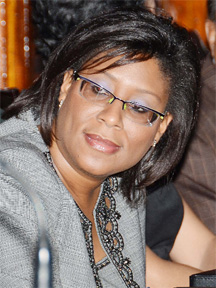With general elections slated to be held in May, the Alliance For Change (AFC) has again accused the state-owned National Com-munications Network (NCN) of bias and has called for a more open policy from the entity.
Speaking with Stabroek News on Saturday, AFC Member of Parliament Cathy Hughes explained that the problem is not a new one. According to Hughes, the state media, particularly NCN, has repeatedly refused to run advertisements from the party. This problem, she said, was initially noted during the AFC’s first election.
“It’s been an ongoing problem,” Hughes said. “We sent ads and commercials to be aired…and they have not played any of the ads except for one that featured some young people. All the others they refused to play.”

Furthermore, Hughes said that as recent as November 2014, the AFC’s show ‘Alliance on the Move’ was sent to NCN with a request for airplay in any available timeslot. This request, she said, was repeatedly sent for weeks before NCN finally responded that the schedule was “tight.”
“So, nowhere in their 24 hours of broadcasting were they able to give some airplay to our show,” Hughes pointed out. “This is a state-owned television station which should be taking ads from any individual once it’s within morals and decency,” she said.
Hughes added that the AFC is not the only party being targeted; A Partnership for National Unity (APNU) has also been refused airplay on NCN and Hughes opined that it was deliberate bias against the opposition parties. “You look at NCN and it only has government ads and as a commercial entity competing with other TV stations…they should allow any organized party to place ads with them,” Hughes said.
When contacted on Saturday, no NCN representative who deals with advertisements was available to comment on Hughes’ claims.
Both APNU and the AFC have complained bitterly about the lack of access to the state media during the campaigning for general elections in November 2011. The state radio monopoly, which was used extensively in the service of the ruling party, was also lamented by the opposition.
A report from the Common-wealth Observer Group following the 2011 elections had noted that lack of independence and impartiality of the media remained a problem. The report further singled out state-owned television, radio and print media, which it said, according to the Media Monitoring Unit, showed overt bias in favour of the ruling party in its coverage and news reporting.
“State-owned media was not alone in providing imbalanced reporting but bias by the state media was excessive,” the report said, noting that state-owned media has a responsibility to serve the interests of all citizens, “particularly as in some parts of the country it is the only media available.”
The Commonwealth said that as a consequence of the media bias and the resources at the disposal of the incumbent, there was not a sufficiently level playing field for campaigning. “While the development of codes of conduct for parties and media is welcomed, it is not enough for them merely to be signed by stakeholders. They must also be adhered to,” the Commonwealth said in its report.
The Organisation of American States (OAS) in a report on the 2011 elections had also recommended a series of reforms to the country’s electoral framework and for more equitable access to the media.
Further, earlier this month, former president Bharrat Jagdeo headed the Commonwealth observer team to observe the Sri Lanka elections and the former president’s report on those elections cited widespread state media bias in favour of the government and the abuse of state resources, the exact criticisms which had been levelled here during the 2011 polls when he was the outgoing President.
Jagdeo’s 12-year administration had long been accused of vulgar abuse of the state media and state resources on behalf of the ruling PPP/C and to burnish its chances particularly during election campaigning.





